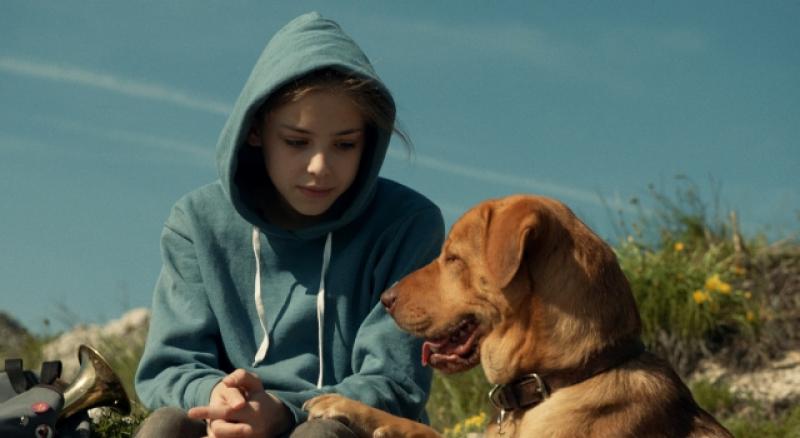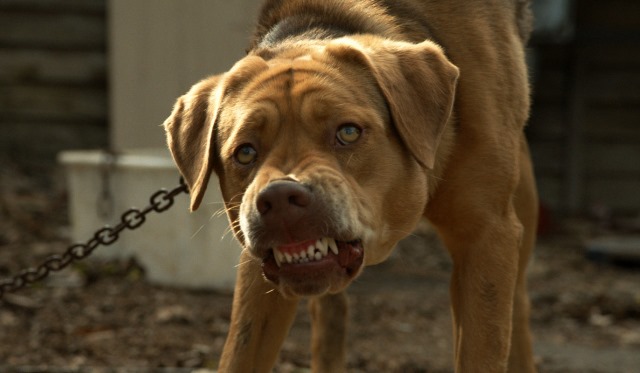White God | reviews, news & interviews
White God
White God
Hungarian allegory on racism and the rise of the far right fails to cohere

With a similar title to Samuel Fuller’s White Dog, White God, too, is an allegory on racism with a canine slant. Where the 1982 film centred on a dog trained to attack black people, Kornél Mundruczó’s film is set in a Hungary where mixed-breed dogs are rounded up and sent to pounds. An edict from a government which is neither mentioned specifically nor seen, permits only pure “Hungarian” breeds. Mutts have to be reported.
In the main, society appears to accept this. Dog catchers in white vans roam Budapest’s streets to round up the forbidden mongrels. Neighbours report on each other if they see a suspect dog.
Although hardly a subtle metaphor for racism and the rise of the far right, the premise of White God wouldn’t be a problem if the film had decided what it was. As it is, Mundruczó seems not have settled on whether he was examining the institutionalisation and normalisation of racism or examining the nature of human brutality. And in terms of its flow White God is a bumpy ride.
The story centres on 13-year-old Lili. Her parents are divorced, and she lives with her father Daniel. She arrives with Hagen, her beloved dog. In common with all adult males in the film, Daniel is angry and dismissive of the feelings and opinions of others. He hates the dog and disdains Lili’s closeness to Hagen. After an incident at a rehearsal of the orchestra she plays trumpet for, Daniel casts Hagen onto the streets.
 The film then tracks the paths of Hagen and the distraught Lili as she tries to find him. The dog teams up with a smaller terrier, but is then caught, drugged and beaten to make him into a fighter and he subsequently kills in an arena. These are brutal scenes. A lucky break brings short-term freedom. After being rounded up by the dog catchers, Hagen (pictured above, after he is forced to become a fighter) leads a breakout from the pound and takes to the streets with hundreds of other dogs. Humans are their target. Police attempt to kill them off.
The film then tracks the paths of Hagen and the distraught Lili as she tries to find him. The dog teams up with a smaller terrier, but is then caught, drugged and beaten to make him into a fighter and he subsequently kills in an arena. These are brutal scenes. A lucky break brings short-term freedom. After being rounded up by the dog catchers, Hagen (pictured above, after he is forced to become a fighter) leads a breakout from the pound and takes to the streets with hundreds of other dogs. Humans are their target. Police attempt to kill them off.
Lili might be a beacon of morality in this ghastly world, but she is placed in situations that don't move the film forward: a not-quite romance with a sympathetic boy in her orchestra; a lengthy and pointless scene in a nightclub. Too much hackneyed point-of-view wobbly-cam action distracts, as does an overbearing use of music to heighten the drama. Given all that has happened, Lili’s rapprochement with her father (Sándor Zsótér) towards the end seems implausible. The closing moments beggar belief.
As Lili, Zsófia Psotta shines. Her scenes with the expressive Hagen are terrific. He’s pretty good on his own too (actually, two dogs took on the role) and has a way with cute head-cocking. The choreography of the dogs – there is no CGI – is breathtaking. But White God is not the sum of its parts.
Over its too-long two hours, and beyond its main premise, White God can't decide whether it's an inside-out Incredible Journey, an upside-down Dawn of the Planet of the Apes, a wonky District 9 or about the unbreakable bond and interrelated tension between human and dog. Although bold and intermittently gripping, the end result smacks of overreaching.
Overleaf: watch the trailer for White God
Watch the trailer for White God
The future of Arts Journalism
You can stop theartsdesk.com closing!
We urgently need financing to survive. Our fundraising drive has thus far raised £49,000 but we need to reach £100,000 or we will be forced to close. Please contribute here: https://gofund.me/c3f6033d
And if you can forward this information to anyone who might assist, we’d be grateful.

Subscribe to theartsdesk.com
Thank you for continuing to read our work on theartsdesk.com. For unlimited access to every article in its entirety, including our archive of more than 15,000 pieces, we're asking for £5 per month or £40 per year. We feel it's a very good deal, and hope you do too.
To take a subscription now simply click here.
And if you're looking for that extra gift for a friend or family member, why not treat them to a theartsdesk.com gift subscription?
more Film
 Die My Love review - good lovin' gone bad
A magnetic Jennifer Lawrence dominates Lynne Ramsay's dark psychological drama
Die My Love review - good lovin' gone bad
A magnetic Jennifer Lawrence dominates Lynne Ramsay's dark psychological drama
 Bugonia review - Yorgos Lanthimos on aliens, bees and conspiracy theories
Emma Stone and Jesse Plemons excel in a marvellously deranged black comedy
Bugonia review - Yorgos Lanthimos on aliens, bees and conspiracy theories
Emma Stone and Jesse Plemons excel in a marvellously deranged black comedy
 theartsdesk Q&A: director Kelly Reichardt on 'The Mastermind' and reliving the 1970s
The independent filmmaker discusses her intimate heist movie
theartsdesk Q&A: director Kelly Reichardt on 'The Mastermind' and reliving the 1970s
The independent filmmaker discusses her intimate heist movie
 Blu-ray: Wendy and Lucy
Down-and-out in rural Oregon: Kelly Reichardt's third feature packs a huge punch
Blu-ray: Wendy and Lucy
Down-and-out in rural Oregon: Kelly Reichardt's third feature packs a huge punch
 The Mastermind review - another slim but nourishing slice of Americana from Kelly Reichardt
Josh O'Connor is perfect casting as a cocky middle-class American adrift in the 1970s
The Mastermind review - another slim but nourishing slice of Americana from Kelly Reichardt
Josh O'Connor is perfect casting as a cocky middle-class American adrift in the 1970s
 Springsteen: Deliver Me From Nowhere review - the story of the Boss who isn't boss of his own head
A brooding trip on the Bruce Springsteen highway of hard knocks
Springsteen: Deliver Me From Nowhere review - the story of the Boss who isn't boss of his own head
A brooding trip on the Bruce Springsteen highway of hard knocks
 The Perfect Neighbor, Netflix review - Florida found-footage documentary is a harrowing watch
Sundance winner chronicles a death that should have been prevented
The Perfect Neighbor, Netflix review - Florida found-footage documentary is a harrowing watch
Sundance winner chronicles a death that should have been prevented
 Blu-ray: Le Quai des Brumes
Love twinkles in the gloom of Marcel Carné’s fogbound French poetic realist classic
Blu-ray: Le Quai des Brumes
Love twinkles in the gloom of Marcel Carné’s fogbound French poetic realist classic
 Frankenstein review - the Prometheus of the charnel house
Guillermo del Toro is fitfully inspired, but often lost in long-held ambitions
Frankenstein review - the Prometheus of the charnel house
Guillermo del Toro is fitfully inspired, but often lost in long-held ambitions
 London Film Festival 2025 - a Korean masterclass in black comedy and a Camus classic effectively realised
New films from Park Chan-wook, Gianfranco Rosi, François Ozon, Ildikó Enyedi and more
London Film Festival 2025 - a Korean masterclass in black comedy and a Camus classic effectively realised
New films from Park Chan-wook, Gianfranco Rosi, François Ozon, Ildikó Enyedi and more
 After the Hunt review - muddled #MeToo provocation
Julia Roberts excels despite misfiring drama
After the Hunt review - muddled #MeToo provocation
Julia Roberts excels despite misfiring drama
 London Film Festival 2025 - Bradley Cooper channels John Bishop, the Boss goes to Nebraska, and a French pandemic
... not to mention Kristen Stewart's directing debut and a punchy prison drama
London Film Festival 2025 - Bradley Cooper channels John Bishop, the Boss goes to Nebraska, and a French pandemic
... not to mention Kristen Stewart's directing debut and a punchy prison drama

Add comment